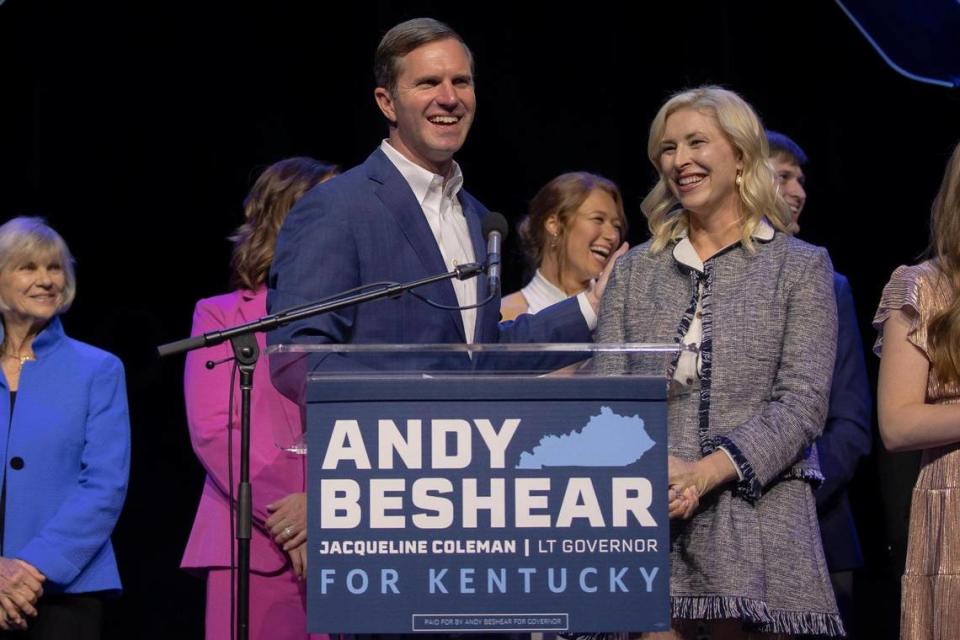Andy Beshear gets four more years. What does that mean for Kentucky?
- Oops!Something went wrong.Please try again later.
- Oops!Something went wrong.Please try again later.
Four more years of Andy Beshear. That’s the mandate Kentucky voters sent Tuesday.
But what does it actually mean for the state? What changes, and, perhaps more important, what remains the same in a second term for the popular Democratic governor?
In speaking with policy experts and legislators on both sides of the political aisle before the election, the Herald-Leader posed questions about what the biggest impact of either candidate winning would be.
For a Beshear second term, the most common responses included:
Key appointments with less conservative zeal, as a second term would stave off a potential overhaul of the Kentucky Board of Education and slower changes to university boards. The Public Service Commission, an all-important utility regulation board, is also less likely to oppose renewable energy and less likely to rail against utility companies coming to terms with coal’s waning relevance.
More people covered by Medicaid, with no work requirements being added for able-bodied individuals and a lesser likelihood of recent Medicaid expansions to vision, dental and hearing care being pulled back.
Democrats in-state and across the nation take heart in Beshear’s victory, proving they can still win in the heartland. Democrats in Kentucky get some wind in their sails and have a platform to push policy. National Democrats see the win as a good indicator for the country’s political mood as its own president struggling mightily in national polls, faces re-election.
Beshear retains a bully pulpit to advocate for or against various policies that the state legislature may pursue, including school choice, changes to the state’s trigger ban on abortion and investments in education.

Relationship with the legislature
While Beshear has plenty to celebrate, hanging over his second term is the relationship, or lack thereof, his administration has with state legislators.
While Beshear scored a pair of politically significant legislative wins – medical marijuana and sports betting – during his first term, it’s unclear if the GOP-led legislature is going to row in the same direction as the governor on any important issues.
For Senate Majority Floor Leader Damon Thayer, R-Georgetown, the relationship between executive and legislative branches is irreparably broken.
“I think it’s too far gone. There’s no incentive or reason for us to work with him… He doesn’t deserve an opportunity for reparation, especially after the campaign. He’s taken credit for all our good work, including some things he vetoed,” Thayer said.
Others were open to the possibility of repairing relations. In the House, Majority Floor Leader Steven Rudy, R-Paducah, sang a different tune while still jabbing the governor.
“I’m open to it,” the West Kentucky legislator said. “I have a district that’s still majority registered Democrat. I wasn’t that partisan of a guy until Andy Beshear made me partisan.”
For some observers, though, it’s unclear if any priorities of Beshear and the legislature could intersect as was the case with legalizing medical marijuana, sports betting and Historical Horse Racing.
“The legislature is gonna look at him and say, ‘We’ve got more than 110 us versus 28 of your party,’” Trey Grayson, former Republican secretary of state, said.
“Where is the medical marijuana, where is the sports gaming? Beshear had to be part of the solution because they couldn’t get a consensus before the veto period. But what else is left?”
Democrats in the legislature, however, think that Beshear’s win will fuel progressive policy victories.
Senate Minority Caucus Chair Reggie Thomas, D-Lexington, thinks that the Democratic governor’s success will be seen as a policy mandate for some.
One of the biggest ones? Universal pre-K.
“When he wins, there’ll be a mandate for universal pre-K. Kentucky needs it. You have about 23 states in this country with some form of universal pre-K – Kentucky’s not one of them, but we will be one of them in the next four years,” Thomas said.

Tax cuts
One of the most monumental movements in state government is Kentucky’s march to zero percent personal income tax.
Who’s governor will have little effect on that movement, as the legislature has the power of the purse and Beshear signed a recent drop in the income tax from 4.5% to 4% despite his Democratic colleagues in the legislature opposing this.
Healthcare
One of the most stark differences between Beshear and Cameron was their stance on Medicaid. Cameron supported adding a work requirement for able-bodied individuals to receive Medicaid while Beshear did not.
With Beshear’s election, it’s likely that no such requirement will be added to Medicaid.
Further, the office retains an advocate for the expansion of vision, dental and hearing benefits to those on Medicaid. The governor expanded Medicaid to cover those benefits in late 2022 and after some sparring with the GOP-led legislature the expansion is still in place.

Abortion
Beshear made criticism of the state’s near-total ban on abortion, which according to one recent poll is quite unpopular with Kentuckians, a central part of his campaign in the final weeks.
Over and over again, Beshear decried the fact that the law lacks exceptions in the case of abortion and incest, with the campaign airing a memorable anti-Cameron ad featuring a woman who was raped and impregnated by her stepafather at age 12.
However, leaders in the legislature see little to no momentum on changing the state’s abortion law despite Beshear’s win.
Rudy said the majority of legislators are more loyal to their own voters, who they see as conservative on the issue, than a statewide gubernatorial result. He added that the House GOP caucus is adopting something of a “wait and see” strategy on pending legal challenges against the ban
“I’m sure those things will be debated and discussed among our colleagues, but we’ll see what the courts do. I don’t think our caucus is ready to move forward with exceptions unless the court strikes down the thing and we have to come back and revisit it,” Rudy said.
Thayer, who represents a predominantly suburban district, struck a slightly different tune.
“I think no matter who wins, it’s going to be something that we wrestle with. The Republican base is in strong support of the current law, and then there are Republicans largely located in the suburbs who favor that we add the two exceptions. Both caucuses are very, very conservative on this issue and we’ll see if anybody pushes for a change on the current law.
Education
The legislature has been pretty firm in its opposition to providing an across-the-board raise to school employees, which was Beshear’s marquee education proposal on the trail.
But with Beshear’s win over Cameron, it means a Kentucky Board of Education reorganized by Beshear shortly after his first election remains in place.
“Think about the difference of a Kentucky Department of Education with a board that’s appointed by Daniel Cameron versus a board appointed by Andy Beshear. I mean, that that’s going to make a difference,” Grayson said.
Further, a big push by conservatives to amend the constitution to allow for school choice programs like the tax credit-funded education opportunity accounts for private school attendees retains a vehement opponent on the state’s biggest bully pulpit.
Rep. Chad Aull, D-Lexington, predicted that Beshear would actively campaign against such an effort
“I think public schools versus charter schools and vouchers is where you’ll see the biggest difference (between Beshear and Cameron). I think he’ll use the pulpit to fight against vouchers, and I think he would veto the vouchers, which prolongs the fight,” Aull said.
Some Republicans admit the issue of school choice will be more difficult to advance with four more years of Beshear.
“It’s a tougher row to hoe if Beshear wins. And you’re also stuck with a guy implementing it, if it passes, who’s antagonistic toward the issue,” Thayer said.
Other appointments
In board and cabinet posts that greatly affect the daily actions of government – from transportation to energy to economic development – expect more of the same from Beshear.
Public higher education institution board appointments would be of particular interest, too, as higher education reform is sweeping the country.
Republican-led states are cracking down on alleged indoctrination in schools, and with Beshear at the helm it’s less likely that governing board appointees will make that a priority.
Certain stalwarts in the Beshear cabinet will be closely watched, too.
Andrew McNeill, a former Bevin official and current president of the Kentucky Forum for Rights, Economics & Education, is particularly interested in what Transportation Cabinet Secretary Jim Gray decides to do over the next Beshear term.
“He’s been state transportation secretary for four years. I think that the legislature, and the leaders of the transportation committees, genuinely respect him and I think they liked them a lot,” McNeill said. “If he were to leave, Andy would have to be very smart about how he would try to replace somebody like Secretary Gray.
Another area where appointments play a huge role is energy policy.
The utility-regulating Public Service Commission makes decisions that greatly affect energy output and utility rates. Another Beshear term likely makes the board less likely to align fully with the posture of the state legislature, which has passed laws to protect coal even as some utility companies want to move away from it for cost reasons.
“A Cameron-appointed PSC would be presumably more pro-fossil fuels than under Beshear, although it hasn’t been, like, anti-fossil fuels. You’d have certainly been more likely to see pro-fossil fuel appointments (under Cameron),” Grayson said.

